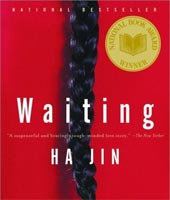The President’s Bookshelf
No matter how busy he is, President Eaton makes time to read. His tastes are eclectic;
he simply loves books. Here are several of his recent selections, with his comments:
 Ha Jin. Waiting (Vintage Books, 1999).“This is a touching, haunting novel by a Chinese exile, now teaching at Boston University, delicately probing the lives of two women and a man caught up in the tangled web of tradition and the ever-present, inexorable force of the government. Here is a glimpse of contemporary Chinese life that is full of tenderness, questioning, and yearning.” Ha Jin. Waiting (Vintage Books, 1999).“This is a touching, haunting novel by a Chinese exile, now teaching at Boston University, delicately probing the lives of two women and a man caught up in the tangled web of tradition and the ever-present, inexorable force of the government. Here is a glimpse of contemporary Chinese life that is full of tenderness, questioning, and yearning.”
Fouad Ajami. The Foreigner’s Gift: The Americans, the Arabs, and the Iraqis in Iraq (Free Press, 2006). “Though the terrible conflict in Iraq can shift over days and months like the sand of the desert, this incredible book gives us a current, in-close look at the tangled web
of forces at work, from the ancient battles between Shiite and Sunni to the nuances of struggle among Arab nations to the inevitable conflict of intruding foreign force. A scholar of Middle East studies from Johns Hopkins University, Ajami offers a detailed, historically rich, clear-eyed, contemporary look at this major
conflict of our day.”
St. Benedict. The Rule of Saint Benedict (Vintage Books, 1981). “This is the classic guide
to authentic monastic life and therefore a rich resource of life in community. Why do I turn to this beautiful book written around A.D. 530?
I find here extraordinary counsel on community formation, and on centering community in worship and the study of the Scriptures, as well as a surprising amount of insight about leadership.”
C. John Sommerville. The Decline of the Secular University (Oxford University Press, 2006). “This is a fabulous new book on what many are calling a crisis in higher education today. Written not at all for those of us in Christian higher education, Sommerville’s take on such a crisis is ‘that the secular university is increasingly marginal to American society.’ The reason lies, he believes, in its fierce effort to banish all traces of religious influence on the academy. Our universities, therefore, ‘are not really where we look for answers to our life questions’ anymore.”
Ian McEwan. Saturday (Nan A. Talese, 2005).
“In this novel, by the British writer Ian McEwan, author of Atonement, the reflections, the stream of thoughts, the events of Henry Perowne, the main character, unfold over the course of one day, a seemingly normal Saturday. The novel then is a day in the life of this neurosurgeon, a successful and seemingly happy man with a wonderful marriage, two professional careers, plenty of money, and two interesting children — one an aspiring musician, the other a young poet. As the plot thickens into some more-than-ordinary events, the thoughts also deepen. What we find beneath the surface of this happy existence is a man of the times, secular to the core, an evolutionary determinist, a philosophical materialist, for whom meaning and ultimate purpose are found in work and family and love-making, and that’s all there is. The world in which he finds himself is confusing and disturbing to a man who is not used to being disturbed and confused. ‘Something has happened,’ he seems to say to himself, ‘and my moral, spiritual, intellectual framework — my worldview — can barely make sense of it all.’”
Max De Pree. Leadership Is an Art (Currency, 1989). “This is my third reading of this wise, wonderful, and helpful book on leadership. Whenever I need to recharge and regroup around a solid core of principles from which to lead, this is my deep well of wisdom and insight. Max is my hero. I highly recommend this book for anyone in leadership at any level, but as well for those who care about healthy, life-giving organizations.”
Back to the top
Back to From the President Home
|